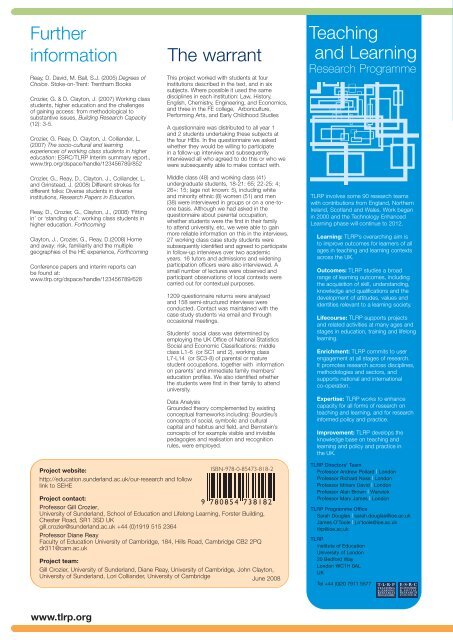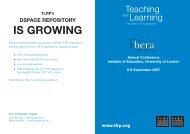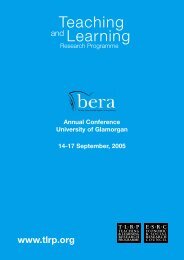The Socio Cultural and Learning Experiences of Working Class ...
The Socio Cultural and Learning Experiences of Working Class ...
The Socio Cultural and Learning Experiences of Working Class ...
You also want an ePaper? Increase the reach of your titles
YUMPU automatically turns print PDFs into web optimized ePapers that Google loves.
Further<br />
information<br />
Reay, D. David, M. Ball, S.J. (2005) Degrees <strong>of</strong><br />
Choice. Stoke-on-Trent: Trentham Books<br />
Crozier, G. & D. Clayton, J. (2007) <strong>Working</strong> class<br />
students, higher education <strong>and</strong> the challenges<br />
<strong>of</strong> gaining access: from methodological to<br />
substantive issues, Building Research Capacity<br />
(12): 3-5.<br />
Crozier, G. Reay, D. Clayton, J. Colli<strong>and</strong>er, L.<br />
(2007) <strong>The</strong> socio-cultural <strong>and</strong> learning<br />
experiences <strong>of</strong> working class students in higher<br />
education: ESRC/TLRP Interim summary report.,<br />
www.tlrp.org/dspace/h<strong>and</strong>le/123456789/852<br />
Crozier, G., Reay, D., Clayton, J., Colli<strong>and</strong>er, L.<br />
<strong>and</strong> Grinstead, J. (2008) Different strokes for<br />
different folks: Diverse students in diverse<br />
institutions, Research Papers in Education.<br />
Reay, D., Crozier, G., Clayton, J., (2008) ‘Fitting<br />
in’ or ‘st<strong>and</strong>ing out’: working class students in<br />
higher education. Forthcoming<br />
Clayton, J., Crozier, G., Reay, D.(2008) Home<br />
<strong>and</strong> away: risk, familiarity <strong>and</strong> the multiple<br />
geographies <strong>of</strong> the HE experience, Forthcoming<br />
Conference papers <strong>and</strong> interim reports can<br />
be found at:<br />
www.tlrp.org/dspace/h<strong>and</strong>le/123456789/628<br />
<strong>The</strong> warrant<br />
This project worked with students at four<br />
institutions described in the text, <strong>and</strong> in six<br />
subjects. Where possible it used the same<br />
disciplines in each institution: Law, History,<br />
English, Chemistry, Engineering, <strong>and</strong> Economics,<br />
<strong>and</strong> three in the FE college, Arboriculture,<br />
Performing Arts, <strong>and</strong> Early Childhood Studies<br />
A questionnaire was distributed to all year 1<br />
<strong>and</strong> 2 students undertaking these subjects at<br />
the four HEIs. In the questionnaire we asked<br />
whether they would be willing to participate<br />
in a follow-up interview <strong>and</strong> subsequently<br />
interviewed all who agreed to do this or who we<br />
were subsequently able to make contact with.<br />
Middle class (48) <strong>and</strong> working class (41)<br />
undergraduate students, 18-21: 65; 22-25: 4;<br />
26+: 15; (age not known: 5), including white<br />
<strong>and</strong> minority ethnic (8) women (51) <strong>and</strong> men<br />
(38) were interviewed in groups or on a one-toone<br />
basis. Although we had asked in the<br />
questionnaire about parental occupation,<br />
whether students were the first in their family<br />
to attend university, etc, we were able to gain<br />
more reliable information on this in the interviews.<br />
27 working class case study students were<br />
subsequently identified <strong>and</strong> agreed to participate<br />
in follow-up interviews over two academic<br />
years. 16 tutors <strong>and</strong> admissions <strong>and</strong> widening<br />
participation <strong>of</strong>ficers were also interviewed. A<br />
small number <strong>of</strong> lectures were observed <strong>and</strong><br />
participant observations <strong>of</strong> local contexts were<br />
carried out for contextual purposes.<br />
1209 questionnaire returns were analysed<br />
<strong>and</strong> 158 semi-structured interviews were<br />
conducted. Contact was maintained with the<br />
case study students via email <strong>and</strong> through<br />
occasional meetings.<br />
Students’ social class was determined by<br />
employing the UK Office <strong>of</strong> National Statistics<br />
Social <strong>and</strong> Economic <strong>Class</strong>ifications: middle<br />
class L1-6 (or SC1 <strong>and</strong> 2), working class<br />
L7-L14 (or SC3-8) <strong>of</strong> parental or mature<br />
student occupations, together with information<br />
on parents’ <strong>and</strong> immediate family members’<br />
education pr<strong>of</strong>iles. We also identified whether<br />
the students were first in their family to attend<br />
university.<br />
Data Analysis<br />
Grounded theory complemented by existing<br />
conceptual frameworks including: Bourdieu’s<br />
concepts <strong>of</strong> social, symbolic <strong>and</strong> cultural<br />
capital <strong>and</strong> habitus <strong>and</strong> field, <strong>and</strong> Bernstein’s<br />
concepts <strong>of</strong> for example visible <strong>and</strong> invisible<br />
pedagogies <strong>and</strong> realisation <strong>and</strong> recognition<br />
rules, were employed.<br />
Teaching<br />
<strong>and</strong> <strong>Learning</strong><br />
Research Programme<br />
TLRP involves some 90 research teams<br />
with contributions from Engl<strong>and</strong>, Northern<br />
Irel<strong>and</strong>, Scotl<strong>and</strong> <strong>and</strong> Wales. Work began<br />
in 2000 <strong>and</strong> the Technology Enhanced<br />
<strong>Learning</strong> phase will continue to 2012.<br />
<strong>Learning</strong>: TLRP’s overarching aim is<br />
to improve outcomes for learners <strong>of</strong> all<br />
ages in teaching <strong>and</strong> learning contexts<br />
across the UK.<br />
Outcomes: TLRP studies a broad<br />
range <strong>of</strong> learning outcomes, including<br />
the acquisition <strong>of</strong> skill, underst<strong>and</strong>ing,<br />
knowledge <strong>and</strong> qualifications <strong>and</strong> the<br />
development <strong>of</strong> attitudes, values <strong>and</strong><br />
identities relevant to a learning society.<br />
Lifecourse: TLRP supports projects<br />
<strong>and</strong> related activities at many ages <strong>and</strong><br />
stages in education, training <strong>and</strong> lifelong<br />
learning.<br />
Enrichment: TLRP commits to user<br />
engagement at all stages <strong>of</strong> research.<br />
It promotes research across disciplines,<br />
methodologies <strong>and</strong> sectors, <strong>and</strong><br />
supports national <strong>and</strong> international<br />
co-operation.<br />
Expertise: TLRP works to enhance<br />
capacity for all forms <strong>of</strong> research on<br />
teaching <strong>and</strong> learning, <strong>and</strong> for research<br />
informed policy <strong>and</strong> practice.<br />
Improvement: TLRP develops the<br />
knowledge base on teaching <strong>and</strong><br />
learning <strong>and</strong> policy <strong>and</strong> practice in<br />
the UK.<br />
Project website:<br />
http://education.sunderl<strong>and</strong>.ac.uk/our-research <strong>and</strong> follow<br />
link to SEHE<br />
ISBN-978-0-85473-818-2<br />
Project contact:<br />
9 7 8 0 8 5 4 7 3 8 1 8 2<br />
Pr<strong>of</strong>essor Gill Crozier,<br />
University <strong>of</strong> Sunderl<strong>and</strong>, School <strong>of</strong> Education <strong>and</strong> Lifelong <strong>Learning</strong>, Forster Building,<br />
Chester Road, SR1 3SD UK<br />
gill.crozier@sunderl<strong>and</strong>.ac.uk +44 (0)1919 515 2364<br />
Pr<strong>of</strong>essor Diane Reay<br />
Faculty <strong>of</strong> Education University <strong>of</strong> Cambridge, 184, Hills Road, Cambridge CB2 2PQ<br />
dr311@cam.ac.uk<br />
Project team:<br />
Gill Crozier, University <strong>of</strong> Sunderl<strong>and</strong>, Diane Reay, University <strong>of</strong> Cambridge, John Clayton,<br />
University <strong>of</strong> Sunderl<strong>and</strong>, Lori Colli<strong>and</strong>er, University <strong>of</strong> Cambridge June 2008<br />
TLRP Directors’ Team<br />
Pr<strong>of</strong>essor Andrew Pollard | London<br />
Pr<strong>of</strong>essor Richard Noss | London<br />
Pr<strong>of</strong>essor Miriam David | London<br />
Pr<strong>of</strong>essor Alan Brown | Warwick<br />
Pr<strong>of</strong>essor Mary James | London<br />
TLRP Programme Office<br />
Sarah Douglas | sarah.douglas@ioe.ac.uk<br />
James O’Toole | j.o’toole@ioe.ac.uk<br />
tlrp@ioe.ac.uk<br />
TLRP<br />
Institute <strong>of</strong> Education<br />
University <strong>of</strong> London<br />
20 Bedford Way<br />
London WC1H 0AL<br />
UK<br />
Tel +44 (0)20 7911 5577<br />
www.tlrp.org

















